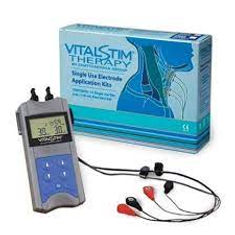Vital Stim Therapy for Swallowing Difficulty
- Ayesha Anjum
- Apr 4, 2023
- 3 min read
Updated: Mar 12, 2024

The incidence and prevalence of swallowing issues are alarming. Are you someone who has swallowing difficulty? Do you know anyone with a feeding issue? In this blog, we are giving an overview of Vital Stim Therapy for Swallowing difficulty.
First, let’s talk about swallowing issues or Dysphagia. Specifically, dysphagia is defined as any difficulty in swallowing while eating. In other words, issues in any of the three stages of swallowing (oral, pharyngeal, and esophageal) will result in dysphagia. To give you an idea, the causes of dysphagia are many. So, ranging from organic to non-organic reasons. Moving on to the treatment for feeding issues. The method of treatment depends on many factors. A swallowing therapist is a professional certified in providing intervention. Vital Stim Therapy is one approach widely used by therapists globally. Hence, keep reading to know more!
So, let’s talk more about Vital Stim Therapy for Swallowing Difficulty.

Vital Stim Therapy is a non-invasive procedure to treat dysphagia. In other words, the vital stim equipment uses electrical current to stimulate swallowing muscles. Electrical current is passed through electrodes. This is fixed on the patient’s swallowing muscles externally on the skin. It provides sensory stimulation to the muscles, in order to improve muscle strength and function. The vital stim device is evidence-based with research backing up its benefits. Further, it is FDA (US Food and Drug Administration) approved for swallowing therapy.

Specifically designed electrodes are attached to the patient’s neck on the skin. This is further attached to a device that delivers electrical current. In other words, a small calculated current is given from the surface electrodes to the motor swallowing muscles. This contracts the muscles to improve swallowing. Further, it also helps the brain to remap the swallowing. It uses Electro-muscular Electrical Stimulation (NEMS) to target muscles. Repeated therapy helps to improve muscle function for swallowing over time.
Who is certified to conduct Vital Stim?
A swallowing therapist, occupational therapist, or a speech-language pathologist certified in Vital Stim Therapy. These are the only professionals who can carry out the therapy. These professionals undergo training and certification to practice using the device. Hence, it is crucial that you get treated only by a registered practitioner.
Who is a candidate for vital stim therapy?
Vital stim is applicable for adults, infants, and children with dysphagia. If you have one or more of the below signs, you can be a candidate for this therapy:
Coughing or choking while swallowing
Difficulty completing a meal
The feeling of the presence of food in the throat
Drooling
Spillage of food and liquid from the mouth while eating
Wet voice or poor voice quality
Feeling pain or discomfort while eating
Chronic lung infections and cold
Unable to eat certain food consistencies (liquids, solids)
Have to swallow multiple times while feeding
Poor nutrition status
Weight loss due to the inability to eat
Patients with neurological swallowing issues
Anyone diagnosed with dysphagia
What is the therapy process?

The therapist first evaluates the patient. Further, during the first testing, a detailed swallowing assessment is done. Then, therapeutic goals are framed. The clinician finds out which muscle will benefit from stimulation during the assessment session. Patients undergo one hour of therapy twice or thrice a week. This depends on the need of each patient.
Furthermore, during the therapy sessions, the therapist will attach and place the surface electrodes at various points in the neck region. Then, a calculated amount of current is delivered to the muscle. At the same time, the therapist will start with traditional swallowing exercises. So, the patient exercises the muscles for up to one hour in each session. Over a period of time, therapeutic gains are noted.
Tips for caution:
Only a certified person can use Vital Stim on patients
It is not suitable for patients with seizures, deep brain stimulators, and pacemakers.
It is avoided for people with cognitive impairments
It has to be conducted in a safe clinical setting only.

Comments